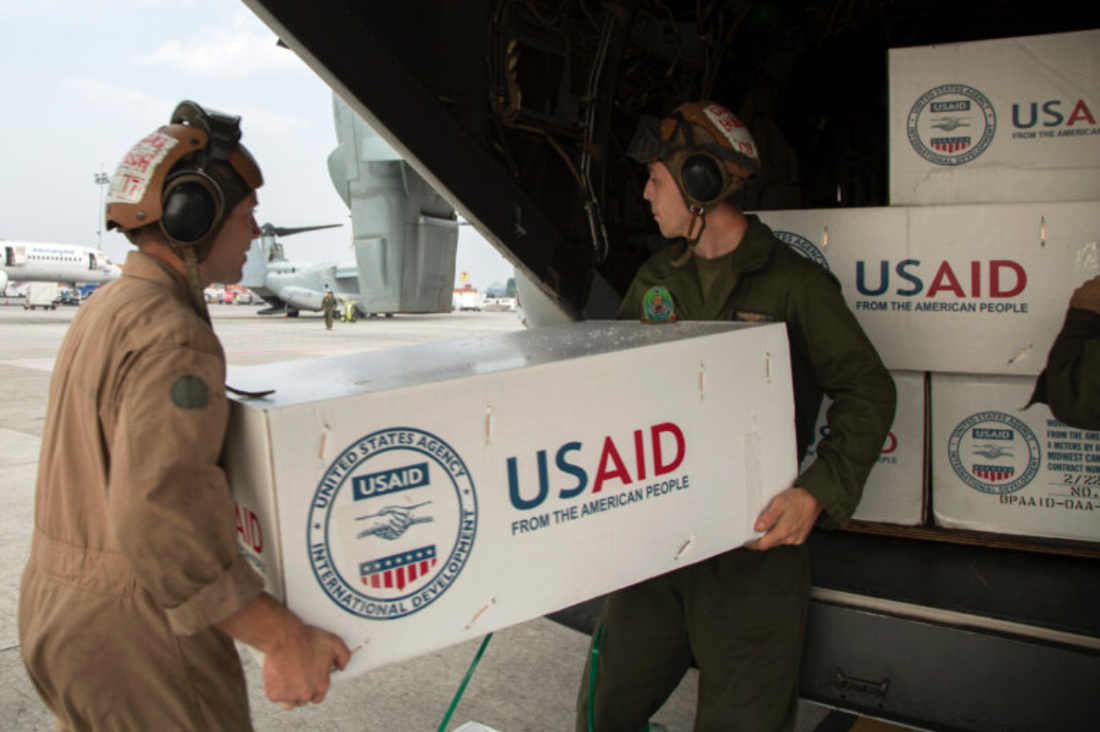
In an article first published on Religion News Service, Rabbi DAVID SAPERSTEIN, senior adviser on strategy and policy at the Union for Reform Judaism, ANWAR KHAN, president of Islamic Relief USA, and Rev EUGENE CHO, president and CEO of Bread for the World, make a joint appeal…
With the cascading crises the world is experiencing in 2023, it is surprising that our elected leaders are considering funding cuts to the United States’ foreign aid commitments. We are leaders from three different faith traditions, but we share a common belief in upholding humanity and human dignity. This is why we urge Congress to robustly fund international food assistance and humanitarian programs.
It is common to hear claims that foreign aid must be reduced to deal with the deficit. However, we also know the great importance these programs have for our nation’s security by helping to create resilience and stability in a challenging world.

US service members from Joint Task Force 505 load relief supplies from the United States Agency for International Development onto a US Marine Corps MV-22 Osprey at Tribhuvan International Airport, Kathmandu, Nepal, on 17th May, 2015. PICTURE: US Marine Corps photo by MCIPAC Combat Camera Lance Cpl. Hernan Vidana/Creative Commons.
Members of the Interfaith Working Group on Foreign Assistance have met with key congressional leaders to educate them about the importance of maintaining international aid funding and programs, and the need for emergency supplemental humanitarian assistance to countries in crisis.
“Members of the Interfaith Working Group on Foreign Assistance have met with key congressional leaders to educate them about the importance of maintaining international aid funding and programs, and the need for emergency supplemental humanitarian assistance to countries in crisis. “
Foreign aid and development funds make up less than one per cent of federal spending. Cut every cent of foreign aid, and we’ve barely touched the deficit. Calling for the cutting of foreign humanitarian aid to deal with the deficit is not a serious proposal, but it will do serious harm.
Ours is a nation built on ideals influenced by our faith communities. The US first provided foreign aid all the way back in 1812 after a devastating earthquake in Venezuela. During World War I and World War II, the US provided aid to civilians suffering the impact. And after World War II, we rebuilt Europe and Japan – possibly becoming the first victor in history to show such deep magnanimity. It’s no coincidence that today the US leads the world in providing emergency food and nutrition assistance, investing in development aid to help strengthen communities and supporting health care and education. That is our calling. However, we are falling behind. China has substantially increased its foreign aid budget, and many of our allies invest a significantly higher percentage of their gross domestic product in foreign aid than we do, including Germany, Canada, Japan, the UK, France and Australia.
Today, many of our closest allies are nations that have received foreign aid, as are many of our leading trade partners. But more than the tangible benefits, America’s aid to those in the greatest need nourishes the soul of our nation. At a time when so many foundational principles are under attack, we must retain our core character of generosity and compassion.
American foreign humanitarian and development aid is among the most effectively managed spending the US Government engages in. Strict requirements are in place, programs are audited, and any agency or individual who violates the terms of aid is held accountable. Around the world, the US enjoys the reputation of being the most exacting donor. And so it should be.
We rely on our readers to fund Sight's work - become a financial supporter today!
For more information, head to our Subscriber's page.
Today, the number of displaced people has risen to 110 million, and as many as 783 million people are facing chronic hunger. Forty-five million children under age 5suffer from wasting, meaning they are much too thin for their height. Approximately one million children each year die from it. This dramatic rise is due to conflicts, climate and inflation. As a nation, we have a choice: Remain true to our character and commitments and provide aid to people in crisis, or we can turn our backs.
As faith leaders, we appeal to our leaders and our fellow citizens to follow God’s calling to care for people in need.
Rabbi David Saperstein is the senior adviser on strategy and policy at the Union for Reform Judaism. Anwar Khan is president of Islamic Relief USA. Rev Eugene Cho is president and CEO of Bread for the World.






